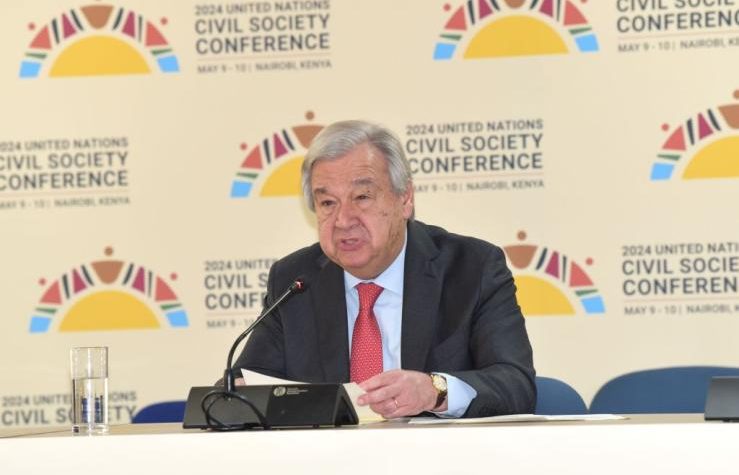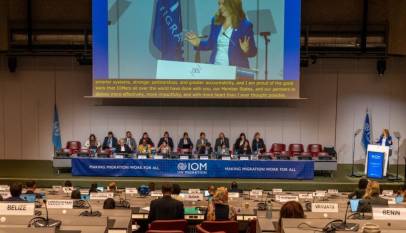“Africa’s Zero Permanent Seat on UN Security Council Unacceptable,” UNSG tells African Newspage
The United Nations Secretary-General António Guterres has described the fact that no African country is a permanent member of the United Nations Security Council as “unacceptable.”
“The multilateral institutions that we have today are the multilateral institutions created since the Second World War. They reflect the world of that time and not the world of today. There is no single African permanent member of the Security Council. That is unacceptable!” Mr Guterres told African Newspage.
Mr Guterres was responding to a question by African Newspage on his commitment towards ensuring there was continued engagement and follow-up around recommendations of the 2024 UN Civil Society Conference (UNCSC2024) in Support of the Summit of the Future (SoTF) held May 9-10 at the UN Office in Nairobi, Kenya, under the theme: “Shaping a Future of Global and Sustainable Progress.”
The Secretary-General said the Bretton Woods institutions (i.e. the World Bank and International Monetary Fund) still reflect the economy of the post-World War II era and were established when most African countries were still under colonial subjugation, hence African countries did not have a say in their formation for which they must be reformed in the interest of “justice and equity” and to enable them respond to the urgent needs of African people.
Mr Guterres noted that many African countries were currently overburdened with and struggling to service their debts, hence often prioritizing debt payments over essential services like education and health, just as they were unable to invest in the Sustainable Development Goals (SDGs). He also bemoaned the devastating effect of climate change on African countries (such as Kenya which was battling with floods) and the lack of adequate financial support from the developed world to fund climate adaptation measures.
“There is a basic unfairness in today’s world and our systems are outdated, unfair and dysfunctional. There was a very strong voice from the civil society in this conference that this must change… There is a need to support developing countries to be able to respond to dramatic impacts like the ones of the recent droughts. So, there is a lot that needs to be changed in our international multilateral system, to make it equitable, to make it fair, to make it correspond to the needs of the people of the 21st century,” the UN chief urged.
Mr Guterres called for a dramatic shift in the global order, asking the international community to create the right framework that will guarantee the kind of support developing countries require facing the enormous challenges of today’s world, noting that the voice of the global civil society at UNCSC2024 was very clear in “telling the governments it is time to move on. We cannot go on postponing decisions. We cannot go on resisting change.”
While addressing the press earlier on, Guterres emphasized Africa’s critical role in addressing the multiple contemporary crises facing the world, decrying the fact that the continent is disproportionately affected by extreme weather events exacerbated by effects of climate change, such as floods, droughts, and other natural disasters, despite having contributed only very little to creating the climate crisis.
The Secretary-General said despite Africa’s huge renewable energy potential and being home to 30% of the minerals critical to renewables and 60% of the world’s best solar resources, the continent receives merely 2% of global renewables investments, which he described as “unfair”. “And Too often countries and communities with critical energy transition minerals are exploited and relegated to the bottom of the value chain, others reap the profits elsewhere.”
“The United Nations is fighting for climate justice. We will develop voluntary principles to ensure developing countries receive maximum benefits. We are calling on developed countries to honor their promises on climate finance, including finding funding to help countries prepare for the worst of climate chaos, for significant contributions to the new loss and damage fund, for action to reform the multilateral development banks so that finance flows to climate action,” Guterres urged.
The UN chief called on the G-20 countries to lead efforts to slash emissions and accelerate the global phase out of fossil fuels while urging African leaders to support these efforts and all governments to, by 2025, create ambitious new national climate plans that drive sustainable development, attract investment while aligning with the goal of limiting global temperature rise to 1.5 so as to avoid the worst of the climate crisis.
Scheduled for September 22-23 in New York, the Summit of the Future (SOTF) would bring together world leaders to forge a new international consensus on how to deliver a better world and safeguard the future. The Nairobi conference, which is the UN’s premier civil society convening, was a platform for dialogue and collaboration among civil society organizations, governments, and other stakeholders to advance the UN’s goals and priorities for a more just, equitable and sustainable world.














